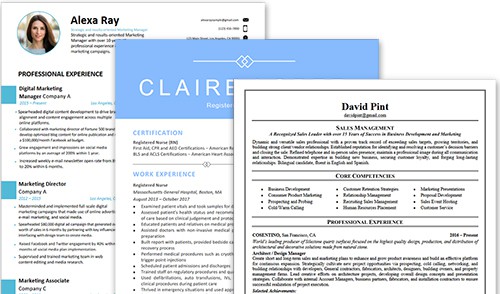10 Types of Interviews You’ll Face
Learn the different types of interviews that may come your way when job hunting.

Got an interview coming up? That’s great! But before you jump right into interview prep mode, it’s important to identify what type of interview you’ll actually be dealing with.
Interviews can come in all shapes and sizes. There’s formal and informal ones. Sometimes there’s one interviewer and other times there’s three. They can go for half an hour or the whole day. To get a better understanding of what’s to come for your interview, here are some common types of interviews you’ll likely face:
If you need professional help writing a resume that can secure you more job interview, know that our professional resume writing services got you covered
1. The Telephone Interview
Companies often request a telephone interview to see if they’d like to extend a face-to-face interview to you. This is done to get an initial feel for what candidates are like and what to expect from them. If they seem like a good fit, then its onward to phase two of the interview process.
The easy part about phone interviews is that you can lay all your notes out right in front of you. You’ll most likely be at home or in a quiet room so just relax and focus on giving a great first impression.
2. The Skype Interview
Interviews on Skype have become very popular as of late. They’re similar to phone interviews, but it’s important to remember here that you’ll very likely be facetiming with the interviewer. Because of that, you’ll want to find a professional setting to have the Skype call. Wear business casual or if you want, put on the full suit and tie – though that usually isn’t necessary. Also, remember to smile!
3. The Face to Face Interview
This is a meeting between you and one or two recruiters from the other company. Usually it’s conducted in some office or business place owned by the employing company and it’s the interview type that everyone stereotypically thinks of when the topic of interviews gets brought up.
4. The Panel Interview
Widely used in the public sector, panel interviews are conducted with a number of people sitting at the panel with one head honcho in the middle calling the shots. This can definitely be an intimidating experience, but the key here is to just think of it as any other interview. After all, even if you’re getting more staring eyes, you’ll only be expected to answer one question at a time like always.
5. The Group Interview
Instead of having multiple interviewers, there’s multiple interviewees like yourself in this case. You’ll be asked to interact with one another and participate in group discussions. It’s important here to be social and speak up. If you show your introvert side, you’ll have a hard time separating yourself from the crowd and making a lasting impression.
6. The Challenging Puzzle Interview
Quick, you have an hour to try and figure out how many people in New York City owns an iPhone. Puzzle interviews are common in highly competitive companies like Google, Apple, and other big-time tech companies. You’re given a short period of time to tackle an extremely difficult task and it’s all about who can rise victorious out of this high-pressure challenge.
7. The Lunch Interview
Yay, you get to talk about yourself while devouring a mouthful of chicken salad. Being treated to lunch by your potential employer usually means you’re getting closer to the end of the interview process. Companies can’t afford to be treating every potential candidate to lunch.
The key here is to vibe with the interviewer. This is less about showing off your technical skills and work experience and more about showing you’re a reasonable and likeable person that can be a good fit for the company culture and team.
8. The Sequential Interview
This is where you’ll have several interviews with a different interviewer each time. Sometimes they like to ask you the same questions to make sure you’re consistent with your answers. It’s their way of making sure you’re consistent and telling the truth.
Usually each interviewer asks questions that focuses on the particular aspect of the job that relates to their own roles in the company. Sometimes it’s designed so you progressively talk with more and more important personnel within the company. First the office secretary could give you a quick conversation, then the assistant manager, and finally the office manager.
9. The Portfolio Interview
If you’re in the design industry, your interviews can revolve around your portfolio of work. Be sure to print out your images and that your portfolio can be accessed online.
10. The Working Interview
Some industries like writing might require you to actually complete a few tasks as part of the interview process. Employers giving these interviews want to see that you can walk the walk and not just talk the talk. With that mentality, these employers will most likely extend job offers to the participants who impressed them the most from these trials while caring far less than usual about your work experience in the past.
